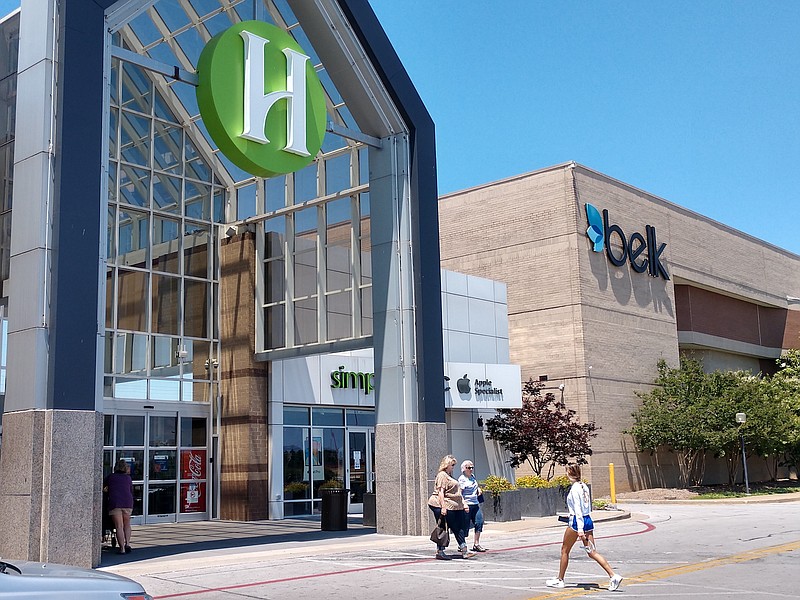Hit by the impact of the coronavirus pandemic, Chattanooga-based mall operator CBL Properties said Friday there's "substantial doubt" it will continue to operate as a going concern within about a year.
In a Securities and Exchange Commission filing, the company that operates Hamilton Place and Northgate malls cited the effect the pandemic has had on "retail and broader markets, the ongoing weakness of the credit markets and significant uncertainties associated with each of these matters."
Last month, the company posted a first quarter net loss of $133.9 million, compared to a net loss of $50.2 million a year ago.
Earlier this week, CBL reported it elected not to make an $11.8 million interest payment that was due on a portion of its long-term debt.
The company said it was exploring alternatives to reduce interest expenses and extend the maturity of its debt in the wake of store closings and deferred rental payments by many tenants in its shopping malls amid the coronavirus outbreak.
Jim Campbell, chief investment officer and managing partner of Campbell Rooks Wealth Management in Chattanooga, said that retailers and real estate owners are stressed for cash amid the coronavirus pandemic.
While more people already were shopping online before the outbreak, the shut down in the economy due to the coronavirus fast forwarded the trend, he said.
Campbell said CBL's latest filing is part of the company's negotiations with its bondholders and banks to work out a plan.
CBL's stock on the New York Stock Exchange on Friday closed up 31.2% to 33.9 cents per share, up 8 cents.
CBL's current portfolio includes 108 properties in 26 states.
Last month, CBL reported in its first quarter earnings that it received just 27% of billed cash rents for April and its May collection rate likely will be in the 25% to 30% range amid closings during the coronavirus outbreak.
"The majority of our tenants requested rent relief, either in the form of rent deferrals or abatements," said Stephen Lebovitz, the company's chief executive. "We have placed a number of tenants in default for non-payment of rent."
Lebovitz, in remarks along with the release of first quarter results, said the company anticipates a significant portion of April and May rents will be collected later in 2020 and into 2021 under agreed upon deferral plans.
However, negotiations are ongoing, and it is premature to estimate a recovery rate, he said.
"While first quarter results were largely as anticipated, the COVID-19 pandemic significantly shifted our expectations for the remainder of the year," Lebovitz said.
Campbell said that while retailers such as JCPenney can't pay as it just filed for bankruptcy reorganization, others can afford to do so but are not.
"It's unfortunate that big publicly traded companies like Chipotle, Starbucks and Gap are not paying rent even though they can or have the abilty to do so and forcing companies like CBL in a precarious position," he said.
CBL, in its filing, said the pandemic has had, and likely will continue to have, repercussions across local, national and global economies and financial markets.
"COVID-19 has impacted all states where the company's tenants operate their businesses or where the company's properties are located...," the CBL filing said. "The company expects a material adverse impact on its revenues, results of operations, and cash flows for the year ended December 31, 2020. The situation is rapidly changing and additional impacts to the business may arise that the company is not aware of currently."
Meanwhile, CBL noted in the filing that it earlier received notice from the New York Stock Exchange that its common stock is no longer in compliance with listing criteria calling for companies to maintain an average closing share price of at least $1 over a period of 30 consecutive trading days.
The company said it has until Oct. 14 to regain compliance. During this period, the company expects its common stock to continue to trade on the NYSE.
CBL said that on May 7, shareholders voted to effect a reverse stock split at a ratio between 1-for-5 and 1-for-25, and a proportionate reduction in the number of authorized shares of common stock to be determined at the discretion of the board for the purpose of complying with listing standards.
The board has not yet taken action to effect the reverse stock split, but the company intends to evaluate and monitor the price of its common stock between now and October.
Contact Mike Pare at mpare@timesfreepress.com. Follow him on Twitter @MikePareTFP.
